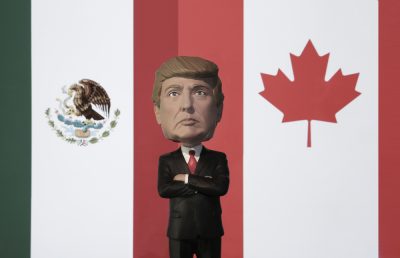
In 2011, Meredith Lilly was pursuing an academic career as a Banting Fellow when her phone rang and pulled her into the world of federal politics. From 2012-2015, Meredith Lilly served as a policy advisor to Prime Minister Stephen Harper, first managing the social policy portfolio and ultimately becoming his foreign affairs and international trade advisor. She was deeply involved in negotiations for the Canada-EU trade agreement, the Trans-Pacific Partnership and the Canada-Korea Free Trade Agreement.
Now an associate professor at Carleton, Professor Lilly teaches a graduate course on NAFTA and specializes in research on temporary entry provisions in trade agreements and cross-border flows of skilled professionals. She keeps a close eye on the world of international trade.
Professor Lilly, the NAFTA agreement was re-opened in August. How would you describe the public tone of the discussion?
The tone is not great because Donald Trump is the first president we’ve dealt with since signing NAFTA who has an openly protectionist, anti-trade stance towards other countries, including Canada. That’s threatening for us because 75 percent of our exports still go to the United States, despite the progress we’ve made in opening new markets.
You were behind the scenes in previous trade agreement negotiations. What’s happening out of the public view?
What happens at the table is a professional negotiation conducted by experts who are not deeply influenced by the political rhetoric happening at the top.
We won’t really know what’s being negotiated until they conclude. Anything you read in the media isn’t a great signal of what’s actually happening. So-called reliable leaks are usually done for political reasons and unreliable leaks are just that: unreliable.
What does Canada hope to gain from the talks?
We have a number of objectives we would like to see furthered in the modernization of NAFTA. They include improving the flow of skilled professionals across the border. We’d also like to improve the ability of Canadian companies to bid on government procurement opportunities within the United States. The expansion of services and digital commerce are also important for all three countries.
Chrystia Freeland, the Minister of International Trade, also has a desire to insert chapters into NAFTA covering labour, the environment, gender and Indigenous issues. The first two are likely to be achieved, but due to the dynamics of this negotiation, I am less confident that gender and Indigenous chapters will be anything more than symbolic.
 How about on the American side?
How about on the American side?
The U.S. and Canada want some similar things out of this negotiation, but they also want to stack the deck in their favour. For example, U.S. Trade Representative Robert Lighthizer would like to increase American content in automobiles, potentially disrupting the NAFTA auto supply chain. He also wants to improve access for U.S. companies to bid on Canadian and Mexican government infrastructure projects without rescinding “Buy American” protections that block our companies from similar markets in the U.S. That kind of unequal treatment doesn’t usually go very far in trade agreements. There’s no reason for us to negotiate such asymmetrical outcomes.
What are your concerns at this point?
My biggest concern is the confidence I hear from some corners that—even if talks fall apart or Donald Trump seeks to terminate NAFTA unilaterally—Canada will still have the old Canada-US deal to fall back on. If Trump signs an order to withdraw, we will be in uncharted territory that will likely find its way to the courts. Experience tells me that such a process could still inflict a great deal of damage on Canada while it’s all sorted out. We may have the moral and legal high ground, but that doesn’t mean we couldn’t see billions of dollars in economic damage to Canada in the meantime.
An example is what happened with country of origin labelling for meat under previous U.S. administrations—basically “Buy America” for beef and pork. The World Trade Organization ruled in favour of Canada and Mexico, but our industry experienced a great deal of loss and some businesses closed altogether in the meantime.
Does Canada have any leverage?
We do have leverage, but we need to be very strategic about deploying it given our much weaker economic clout. The Liberal government has done a good job of fanning across the U.S. and talking to governors, mayors and members of Congress to remind them about the importance of Canada as an export market for goods and as part of the supply chain for companies. So the leverage is diffuse, but can be powerful, if enough powerful Americans are swayed to support our objectives.
Friday, September 22, 2017 in FPA Voices, News
Share: Twitter, Facebook



